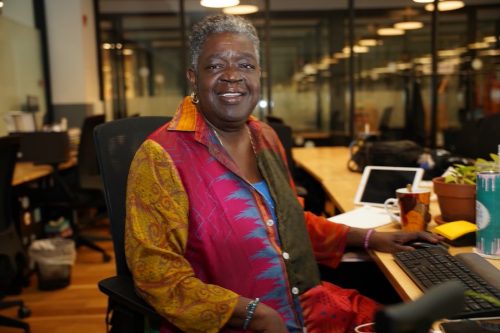
By Harlem World Magazine
Top social media CEOs from TikTok, Meta, Discord, Snapchat, and X are testifying to Congress about their failure to protect children online.
Survivors of online sexual exploitation and abuse of children (OSEAC) and advocates are urging lawmakers to pass measures that will hold social media companies accountable and put in place measures to take down child sexual abuse material that appears on their platforms.
One of the survivors who is part of these efforts, Christine Almadijan, a graduate student at Columbia University in Harlem, advocate for the Youth Power Project, and the representative for the End OSEAC Coalition’s Survivor Council. She speaks about her work with the End OSEAC Coalition.
Christine Almadijan is a graduate student at Columbia University, an advocate for the Youth Power Project, and a representative for the End OSEAC Coalition’s Survivor Council. Before her graduate studies, she obtained her undergraduate degree at the University of Southern California.
It was there that her passion for this work grew immensely. She worked with the Survivor Support Community as an Advocacy Director, which provided resources and a community space for survivors on campus. Her interests lie in the intersection between survivor justice, cultural constraints and impacts on survivorship, and restorative justice.
Currently, Christine’s work revolves around the protection of minors online, especially as it pertains to accountability taken by social media to aid in these protective efforts. Her greatest aspiration is to create massive change within the legal community as it pertains to survivors, specifically, by creating a law firm by survivors, for survivors.
We asked Christine several questions in an interview:
Harlem World Magazine: Can you share your perspective on the upcoming Congressional hearing involving top social media CEOs? What are your expectations for this testimony?
Christine Almadijan: Personally, it is difficult to imagine a hearing in which these tech CEOs would truly accept their responsibility for the issues concurrent with social media. The problem of child sexual assault materials, sextortion, and the impact that has had on survivors is due to their negligence and apathy regarding these issues; they continue to exist and evolve in a way that benefits predators. My expectations are testimony by all of them based on false promises, as that has been the case all this time and before this hearing. If getting some of the CEOs to the hearing involved subpoenas, I cannot imagine they are willing to take responsibility or pledge to make an actual, tangible difference.
HWM: As a survivor and advocate, what motivated you to participate in the End OSEAC Coalition’s Survivor Council? Could you tell us about your role and contributions?
CA: I can personally recall the predators that forced their way into my online existence, threatening my livelihood and my inability to discern danger from safety. These experiences became incredibly common, almost an unfortunate, defining factor of our early years navigating through social media. Although we would try to take action to defend ourselves, it was no use. Dangerous figures continued to remain in our vicinity, whether that was on the duplicate accounts or new ones they created quickly. I grew older and slowly started understanding what had happened to me and so many of my peers. As children, we had the right to a safe and fun social media experience. All we wanted to do was enjoy this new interactive life with one another.
HWM: What specific measures or changes would you like to see social media companies implement to better protect children online and combat child sexual abuse material?
CA: I ask that these platforms further evaluate the effectiveness of their current technology when detecting CSAM and other predatory behaviors on their platforms. The present safety features are just not sufficient. I also ask that they listen to survivors and a very concerned society. This request can no longer be merely “considered” and once again neglected. Social media is only continuing to advance and grow, and it is their absolute responsibility to ensure the safety and security of their users. I do not want another child’s experience on social media to be one marked by a lack of safety and risk of exploitation. They absolutely have the capability to make these changes efficiently, and I demand that you do so to ensure a safer, more equitable future for social media users, especially those who are children and survivors.
HWM: How do you believe your work with the Youth Power Project aligns with the goals of the End OSEAC Coalition, especially in the context of protecting minors online?
CA: The Youth Power Project has done an excellent job at demystifying the involvement process in politics, whether at local, state, or federal levels, for younger people. Since joining the organization, I have been provided with the ultimate support and guidance in navigating through that process myself, as I was once intimidated by stepping into this realm. The Youth Power Project also works directly with state legislation efforts regarding protecting children online, and their commitment to those projects aligns directly with the End OSEAC Coalition’s goals and aspirations.
HWM: Given your experiences as an Advocacy Director with the Survivor Support Community at the University of Southern California, how has your advocacy evolved, and what challenges have you encountered in championing survivor justice?
CA: Being an Advocacy Director at USC was an incredibly emotionally-tolling task. That was my first time doing work with other survivors, and I had not expected it to be as tricky mentally. Desensitizing myself to brutal realities is a tactic I have used for almost a decade concerning my reality and healing, but being an Advocacy Director almost shook me out of that tactic. I had to confront many dark realities for the student body, survivors, and allies of the cause on campus. The emotions, reactions, and anger were incredibly present as the university remained complicit in the student community’s outcries. This was among only one of the many challenges. Other challenges ranged from a lack of clarity with resources available for survivors to ignorance from the administration regarding rampant sexual assault on campus. I channeled my frustration alongside other survivors into proactive work. I went from someone who would shake with fear to someone who has grounded herself in her pursuits for justice for communities of survivors.
HWM: In your opinion, what role does cultural awareness and understanding play in addressing the impacts of online sexual exploitation and abuse of children?
CA: As middle schoolers, many of us were entering a new realm of interaction as access to smartphones grew exponentially. Alongside the group chats with friends and interactive game apps came the hustle and bustle of social media. Some apps, such as Snapchat, Twitter (X), and Meta, were among the most popular. I remember my friends and I sitting around one another at lunch, retweeting posts about One Direction, and taking selfies with filters to send one another on Snapchat. What we initially considered fun took very dark turns for many of us. As children, we did not have the foresight to detect dangerous situations the way we might now, or the way I at least do. As we were invited to chat groups and private messaging avenues on the apps, exposure to predators became concurrent with our social media experience.
HWM: Could you share some insights into the intersection between survivor justice, cultural constraints, and their impacts on survivorship, based on your academic and advocacy experiences?
CA: Within my own community, it is challenging to break the shackles of taboo and shame regarding sexual assault. This is the same struggle many other minority communities face, as religious and cultural foundations shape much of the interaction people have with survivorship. There are preconceived notions that plague sexual assault, such as it not existing within the community and the idea that sexual assault only happens to those who “invite it in.” Having access to resources, therefore, is exponentially more difficult for a survivor, as they fear being shunned by their community and accused of being at fault for their survivor status. It is imperative, then, to focus on dialogue and demystifying sexual assault within these communities. Much like my own, a lack of education and understanding also impacts a survivor’s experience through navigating justice, and that must change.
HWM: As a graduate student at Columbia University in Harlem, how do you plan to leverage your education and experiences to contribute to the protection of minors online and survivor justice?
CA: I am fortunate to have access to an education at Columbia, as it has provided me with the tools necessary to reach many of my goals within this work. Leveraging my own experiences and education means prioritizing grassroots efforts, especially alongside other survivors who want to work in the realm of justice. Survivor communities have directly contributed to the momentum surrounding change, which needs to continue when tackling the issue of dangerous people and communities on social media. Protecting people online against sexual assault, especially minors, and ensuring paths to justice for survivors are the foundations of my work and will continue to guide me in my efforts.
HWM: What steps do you think lawmakers should take to hold social media companies accountable for their role in online child exploitation, and what legislative changes would you advocate for?
CA: I urge lawmakers to support the Eliminating Abusive and Rampant Neglect of Interactive Technologies (EARN IT) Act and the Strengthening Transparency and Obligations to Protect Children Suffering from Abuse and Mistreatment (STOP CSAM) Act.
HWM: Looking ahead, what are your aspirations for creating change within the legal community, specifically to survivors, and how does your vision of a law firm by survivors, for survivors, fit into this aspiration?
CA: Seeking justice after sexual assault is a challenging process, especially if the survivor wants to take the legal route. The realm of law is difficult to understand and apply, and many survivors feel anxious and scared when it comes to navigating through that process. Furthermore, it is difficult to find comfort in a person representing you when that person has not personally felt the realities aligned with survivorship. For these reasons, my ultimate legal goal is to create a firm for survivors by a survivor-led team of lawyers. My goal is not just to represent somebody as their lawyer but rather to represent a survivor as a survivor and a lawyer. With this, I hope to demystify this process for survivors and create a space of genuine empathy for other survivors seeking legal action and justice.
Photo credit: Source.
- How To Choose The Right Corporate Travel Management Provider For Your Business?
- How Having A Dog Can Enhance Your Overall Mental Health
- 10 Tips To Maximize Your Air Conditioner’s Efficiency
- New Gear For Fall On The Rise For You And Your Harlem Home
- NYIC Launches ‘New York Proud’ Public Art Campaign Celebrating Immigrant Stories Across NYC
Become a Harlem Insider!
By submitting this form, you are consenting to receive marketing emails from: Harlem World Magazine, 2521 1/2 west 42nd street, Los Angeles, CA, 90008, https://www.harlemworldmagazine.com. You can revoke your consent to receive emails at any time by using the SafeUnsubscribe® link, found at the bottom of every email. Emails are serviced by Constant Contact








